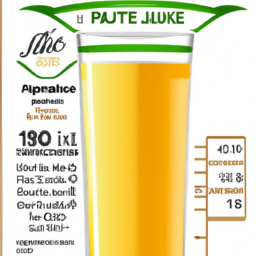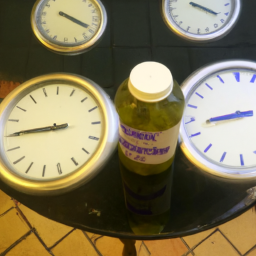Lemons are often a crucial ingredient in many recipes, adding a lively and tangy flavor to dishes both sweet and savory. But have you ever wondered if you’re getting the most juice out of your lemon when you squeeze it?
Fear not, for I have delved into the science of lemon juice extraction to bring you the ultimate guide on how much juice you can expect to get from one lemon.
Prepare to be amazed, because the answer is not as straightforward as you may think. The amount of juice in a lemon can vary based on a variety of factors, from the ripeness of the fruit to the temperature of the room.
But fear not, for armed with the knowledge I will provide, you’ll be able to extract every last drop of juice from your lemons and take your culinary creations to the next level.
So, let’s get to it and find out just how much lemon juice we can expect from one lemon.
Key Takeaways
- The amount of lemon juice that can be extracted from a lemon can be affected by factors such as its ripeness and temperature.
- Rolling and warming lemons can help release more juice, while using a citrus juicer or reamer is the best method for extracting juice.
- On average, one lemon yields about 2-3 tablespoons of juice, and techniques such as microwaving and cutting can help extract more juice.
- Lemon juice is high in Vitamin C and citric acid, and has been linked to weight loss and various health benefits. It is best stored at room temperature.
Factors that Affect the Amount of Juice in a Lemon
You’ll be surprised at how much juice you can get from one lemon depending on factors like ripeness and temperature! The amount of juice in a lemon can vary greatly depending on these factors.
The juiciness of citrus fruits can be affected by many factors, including weather conditions, the age of the fruit, and even the time of day when it is picked.
When it comes to lemon and lime juice extraction techniques, there are a few differences to keep in mind. Limes tend to have less juice than lemons, and their juice is also more acidic.
To extract the most juice from a lemon, it’s best to roll the fruit on a hard surface before cutting it open. This helps to break down the cells in the fruit and release more juice. Additionally, warm lemons are easier to juice than cold ones, so it’s best to take them out of the refrigerator about an hour before you plan to use them.
Now that we know about the factors that affect citrus juiciness and different lemon vs lime juice extraction techniques, let’s move on to discussing the average amount of juice in one lemon.
Average Amount of Juice in One Lemon
Did you know the typical amount of juice found in a single lemon? On average, one lemon yields about 2-3 tablespoons of juice. However, this amount can vary depending on factors such as the size of the lemon, its ripeness, and the extraction method used.
When it comes to health benefits, lemon juice is a great source of Vitamin C and citric acid. These nutrients have been shown to boost the immune system, aid in digestion, and even improve skin health. Additionally, lemon juice has been linked to weight loss and reducing the risk of certain diseases. Incorporating lemon juice into your diet can provide a nutritional boost to your overall well-being.
Moving on to the next section about tools to extract lemon juice, it’s important to note that the amount of juice you get from one lemon can also depend on the method you use to extract it.
Tools to Extract Lemon Juice
Using tools such as a citrus juicer or hand-held reamer can easily extract the tangy, yellow liquid from a fresh, zesty fruit. These are among the best juicing methods you can use to get the most juice out of your lemons.
A citrus juicer is an electric appliance that extracts juice from citrus fruits using a motorized reamer. On the other hand, a hand-held reamer is a manual tool that has a cone-shaped head with ridges that are used to extract the juice by twisting the lemon on top of the ridges.
There are alternative squeezing techniques that you can also use if you don’t have a citrus juicer or hand-held reamer. For instance, you can use a fork to prick the lemon and roll it back and forth on a hard surface to soften it. This technique helps to break down the fibers and release the juice. Additionally, you can cut the lemon in half and use a spoon to scoop out the flesh while squeezing the juice into a bowl. These techniques may not be as efficient as using a juicer or reamer, but they’re still effective.
When it comes to getting the most juice out of your lemons, there are a few tips to keep in mind. One of the most important is to make sure your lemons are at room temperature before juicing them. This helps to soften the fruit and makes it easier to extract the juice. Additionally, rolling the lemon on a hard surface before juicing it can help to break down the fibers and release more juice.
With these tips and tools, you can easily extract the maximum amount of juice from your lemons.
Tips for Getting the Most Juice Out of Your Lemons
When I need to extract lemon juice, I often find myself struggling to get the most out of each fruit. Through my own experimentation and research, I’ve found several tips that have significantly increased my yield.
Rolling the lemon on a hard surface, microwaving it briefly, and cutting it lengthwise are all effective techniques that can help you get the most juice out of your lemons.
Roll the Lemon
Rolling the lemon is an easy way to get the most out of your citrus. It helps to break down the cells inside, making the juice easier to extract. Here are some benefits of rolling lemons and the best techniques for doing so:
- Rolling the lemon helps to release more juice.
- It makes the lemon easier to squeeze.
- The juice comes out faster.
- Rolling the lemon helps to avoid waste.
- It’s a quick and easy step that can make a big difference.
To roll a lemon, place it on a hard surface and press down on it with the palm of your hand. Roll it back and forth a few times, applying gentle pressure as you go. You should feel the lemon becoming softer and more pliable.
Once you’ve rolled it, slice it in half and squeeze out the juice.
Microwaving the lemon is another technique that can help to release more juice.
Microwave the Lemon
After rolling the lemon, another method to extract its juice is by microwaving it. This method has its advantages, which I’ve found to be helpful in my own kitchen.
The benefits of using a microwave to extract lemon juice include faster extraction time, as compared to traditional juicing methods, and a higher yield of juice. Microwaving the lemon for about 10-15 seconds softens the fruit and breaks down its cell walls, making it easier to extract the juice. As a result, more juice can be extracted from each lemon, which is beneficial when making large batches of lemonade or using lemons in recipes. Moreover, it saves time and effort, as there’s no need to cut and squeeze the lemon manually. However, it’s important to note that microwaving the lemon for too long may cause it to explode, so it’s recommended to monitor it closely.
In comparison to the previous method of rolling the lemon, microwaving it is a more modern and time-efficient way of extracting its juice. The next step in the process is to cut the lemon lengthwise, which will allow for further extraction of its juice.
Cut the Lemon Lengthwise
Now it’s time to slice the lemon lengthwise, revealing its juicy insides and tantalizing aroma. Cutting the lemon lengthwise instead of crosswise has several benefits. Firstly, it makes it easier to remove the seeds as they are concentrated in the center of the fruit. Secondly, it allows for more surface area to be exposed, making it easier to extract all the juice.
There are also techniques for juicing lemons without cutting them. One method is to roll the lemon on a hard surface, applying pressure with your palm to soften it up. Then, poke a few holes in the lemon and squeeze it with your hand, using a strainer to catch the seeds. Another method is to microwave the lemon for a few seconds before juicing, which can help release more juice. However, cutting the lemon lengthwise is still the most efficient way to extract as much juice as possible.
As we move on to the next section about how to store lemons for optimal juiciness, it’s important to note that the way you cut the lemon can affect its shelf life. So, let’s explore some tips and tricks for keeping your lemons fresh and juicy.
How to Store Lemons for Optimal Juiciness
So, when it comes to storing lemons for optimal juiciness, there are three main methods to consider: room temperature, refrigeration, and freezing. Personally, I’ve found that keeping my lemons at room temperature is the best way to ensure they remain juicy and flavorful.
However, refrigeration and freezing can also be effective techniques, depending on your specific needs and preferences. Let’s dive into each method and explore the factors that can impact the juiciness of your lemons.
Room Temperature
At room temperature, a juicy lemon will yield about 2-3 tablespoons of lemon juice, making your taste buds dance with zesty delight.
The benefits of using room temperature lemons for juicing are two-fold. Firstly, when a lemon is stored at room temperature, it becomes softer and more pliable, making it easier to extract the juice. Secondly, room temperature lemons have a higher juice yield compared to cold lemons. This is because the warmth of the room helps to break down the cell walls of the lemon, releasing more juice.
If you’re looking to get the most juice out of your lemons, the best time to juice them is when they are at room temperature. This will ensure that you get the maximum amount of juice possible. However, if you store your lemons in the refrigerator, it’s important to let them sit at room temperature for a few hours before juicing them. This will help to soften the lemon and make it easier to extract the juice.
In the next section, we’ll discuss the effects of refrigeration on lemon juice yield.
Refrigeration
If you’re storing your lemons in the fridge, you may be surprised to learn that refrigeration can have a significant impact on the yield of your lemon juice. Lemons that are stored in a cold environment tend to have thicker and tougher skin, which can make it more difficult to extract the juice. Additionally, the cold temperature can cause the lemon to lose some of its natural moisture, which can result in a lower juice yield.
Despite the potential impact on juice yield, refrigeration can be beneficial for lemons in other ways. For example, keeping lemons in the fridge can help to prolong their shelf life and prevent them from spoiling. Additionally, refrigeration can help to preserve the beneficial nutrients in lemon juice, which can provide a range of health benefits.
Lemon juice is rich in vitamin C, antioxidants, and other compounds that can support immune function, aid digestion, and even be used for cleaning purposes. With that said, if you’re looking to maximize your lemon juice yield, it may be worth considering alternative storage methods, such as keeping your lemons at room temperature or freezing them.
Freezing
Now that we’ve talked about refrigerating lemon juice, let’s move onto the topic of freezing it. Freezing lemon juice is a great way to extend its shelf life and ensure that you always have fresh lemon juice on hand.
Here are some things to keep in mind when freezing lemon juice:
-
Uses for frozen lemon juice: Frozen lemon juice can be used in a variety of ways, including as a base for marinades and dressings, to add flavor to baked goods, and to make lemonade or other drinks.
-
Benefits of using fresh lemon juice over bottled: While bottled lemon juice is convenient, it often lacks the fresh, bright flavor of freshly squeezed lemon juice. Freezing fresh lemon juice allows you to have the taste of fresh lemons available year-round.
By freezing lemon juice, you can enjoy the benefits of fresh lemon juice without having to worry about it going bad before you can use it. However, there are also some downsides to freezing lemon juice, such as the fact that it can become slightly diluted when frozen and thawed. Overall, though, freezing lemon juice is a great way to make the most of this versatile citrus fruit.
Moving on to the next topic, let’s talk about lemon juice substitutes.
Lemon Juice Substitutes
Using a lemon juice substitute can be a lifesaver when you’re in a pinch, but as the saying goes, nothing beats the real thing. Lemon juice is an essential ingredient in many recipes, including cocktails, sauces, and marinades. However, there are times when fresh lemons are not available, and that’s when lemon juice substitutes come in handy.
There are several benefits of using lemon juice substitutes, including convenience, cost-effectiveness, and longer shelf life. Lemon juice substitutes are readily available in most supermarkets and come in different forms, such as bottled lemon juice, powdered lemon juice, and citric acid. They can be used as a one-to-one replacement for fresh lemon juice in most recipes. When using a substitute, it’s essential to be mindful of the recipe’s acidity level and adjust the amount of substitute accordingly. For example, if a recipe calls for one tablespoon of fresh lemon juice, you can substitute it with one tablespoon of bottled lemon juice or half a teaspoon of citric acid dissolved in one tablespoon of water.
| Lemon Juice Substitute | Pros | Cons | Best ways to use |
|---|---|---|---|
| Bottled Lemon Juice | Convenient, longer shelf life | May contain additives, lacks fresh flavor | Sauces, marinades, dressings |
| Powdered Lemon Juice | Cost-effective, longer shelf life | May contain additives, lacks fresh flavor | Baking, cooking, seasoning |
| Citric Acid | Highly concentrated, longer shelf life | Can be difficult to find, needs to be dissolved in water | Cocktails, marinades, pickling |
Moving on to recipes that call for lemon juice, it’s essential to have fresh lemons on hand. In the next section, I will discuss the best ways to extract lemon juice from fresh lemons and provide tips for storing and preserving leftover lemon juice.
Recipes that Call for Lemon Juice
When incorporating lemon juice in recipes, it adds a tangy and refreshing flavor to dishes like fish, chicken, and salads. Using fresh lemon juice has numerous benefits compared to using bottled juice. Fresh lemon juice is richer in flavor, has more nutritional value, and is free from additives and preservatives.
When using fresh lemon juice, it is important to use the right amount. Generally, one lemon yields about 2-3 tablespoons of juice, but this can vary based on the size and ripeness of the lemon.
Lemon juice is not limited to just cooking. It’s also a popular ingredient in cocktails and mocktails. The acidity of lemon juice balances the sweetness in cocktails and adds a bright citrus flavor. Popular drinks like the Whiskey Sour, Margarita, and Lemon Drop Martini all contain lemon juice. It can also be added to non-alcoholic drinks like lemonade, iced tea, and soda. Incorporating lemon juice in various drinks is a versatile way to enhance the flavor profile.
Moving on to other uses for lemons, they have a wide range of benefits beyond just cooking and drinks.
Other Uses for Lemons
You’ll be amazed at the surprising and versatile ways lemons can benefit your daily life. Did you know that the health benefits of lemons go beyond just adding a squeeze of lemon juice to your water or tea? Lemons are rich in vitamin C, which is essential for healthy skin, hair, and nails. They also contain antioxidants that help to fight free radicals in the body, which can lead to cell damage and disease.
In addition to their health benefits, lemons can also be used in DIY beauty treatments. For example, mixing lemon juice with honey and applying it to your face can help to brighten and soften your skin. Lemon juice can also be used as a natural hair lightener, by mixing it with water and spraying it onto your hair before spending time in the sun.
So, the next time you’re at the grocery store, pick up a few lemons and try out some of these amazing uses for yourself.
As you move onto the next section about ‘lemon varieties’, it’s important to note that not all lemons are created equal. Some varieties, like Meyer lemons, are sweeter and less acidic than traditional lemons, making them perfect for use in desserts and cocktails. Stay tuned to learn more about the different types of lemons and how to choose the best one for your needs.
Lemon Varieties
If you’re a fan of adding a touch of tanginess to your dishes, then you’re in luck because there are various types of lemons available, each with its own unique flavor profile. Lemon flavor can range from tart and acidic to sweet and floral, depending on the variety of lemon used.
Some popular lemon varieties include:
-
Eureka: A common lemon variety with a bright yellow skin and tart flavor. It’s available year-round and is great for cooking and baking.
-
Meyer: A sweeter and less acidic lemon variety with a thin, smooth skin. Meyer lemons are in season from winter to early spring and are perfect for desserts and cocktails.
-
Lisbon: A larger, more tart lemon with thick skin. Lisbon lemons are available year-round and are ideal for making lemonade or preserving.
-
Ponderosa: A unique, large lemon with a thick, bumpy skin and a mild flavor. Ponderosa lemons are available in the winter and are great for adding zest to dishes.
-
Femminello: A popular Italian lemon variety with a thin, fragrant skin and a strong, sour flavor. Femminello lemons are in season from winter to spring and are great for making marmalade or adding to marinades.
It’s important to note that lemon seasonality varies depending on the variety and location. Some lemons may only be available during certain months, while others may be available year-round.
Understanding the different lemon varieties and their seasonality can help you choose the best lemon for your dish and ensure that you’re getting the freshest and most flavorful fruit.
Frequently Asked Questions
Can you use bottled lemon juice instead of fresh lemon juice in a recipe?
I prefer using fresh lemon juice in my recipes, as bottled lemon juice may contain additives and lack the same level of acidity and flavor. However, in a pinch, bottled juice can be a convenient substitute.
How long do lemons typically last before they go bad?
Lemons typically last for about 2-4 weeks when stored in the fridge. The shelf life can be extended by placing them in a plastic bag with holes to maintain moisture. As they age, the ripeness affects flavor and juice yield.
Is it possible to freeze lemons to preserve their juiciness?
Freezing lemons is possible, but it may affect the texture and flavor of the fruit. The pros include convenience and extended shelf life. To use frozen lemon juice in recipes, thaw and strain the juice.
What is the difference between a Meyer lemon and a regular lemon in terms of juice yield?
As a citrus expert, I’ve discovered that Meyer lemons have a sweeter, less acidic flavor than regular lemons but their juice yield is about the same. To maximize juice extraction, try rolling the lemon before squeezing. Both types can be stored at room temperature or in the fridge for up to a week.
Can you use a citrus juicer to extract juice from other fruits besides lemons?
I’ve found that citrus juicers can be used for other fruits besides lemons, such as limes, oranges, and grapefruits. However, the limitations of a citrus juicer may result in lower juice yield compared to other extraction alternatives.
Conclusion
So, there you have it, folks! We’ve covered all the factors that affect the amount of juice in a lemon. The average amount of juice in one lemon can vary, but with the right tools and techniques, you can maximize your yield.
Tips for getting the most juice out of your lemons:
- Roll the lemon on a hard surface to break up the cells and release more juice.
- Microwave the lemon for a few seconds to warm it up and make it easier to juice.
- Cut the lemon lengthwise and squeeze it over a strainer to catch any seeds or pulp.
How to store lemons for optimal juiciness:
- Keep lemons at room temperature or in the refrigerator.
- Store cut lemons in an airtight container or plastic wrap to prevent them from drying out.
Lemon juice substitutes:
- Lime juice
- Vinegar
- White wine
Recipes that call for lemon juice:
- Lemon vinaigrette
- Lemon bars
- Lemon chicken
Other uses for lemons:
- Cleaning
- Skin care
- Freshening up your garbage disposal
Different varieties of lemons available:
- Eureka lemons
- Lisbon lemons
- Meyer lemons
In conclusion, I can confidently say that the humble lemon is a versatile and essential ingredient in any kitchen. Lemons truly are a wonder fruit, and I highly recommend incorporating them into your culinary repertoire for a burst of flavor that’s sure to make your taste buds sing!









